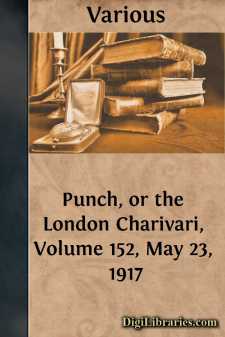Categories
- Antiques & Collectibles 13
- Architecture 36
- Art 48
- Bibles 22
- Biography & Autobiography 813
- Body, Mind & Spirit 142
- Business & Economics 28
- Children's Books 15
- Children's Fiction 12
- Computers 4
- Cooking 94
- Crafts & Hobbies 4
- Drama 346
- Education 46
- Family & Relationships 57
- Fiction 11828
- Games 19
- Gardening 17
- Health & Fitness 34
- History 1377
- House & Home 1
- Humor 147
- Juvenile Fiction 1873
- Juvenile Nonfiction 202
- Language Arts & Disciplines 88
- Law 16
- Literary Collections 686
- Literary Criticism 179
- Mathematics 13
- Medical 41
- Music 40
- Nature 179
- Non-Classifiable 1768
- Performing Arts 7
- Periodicals 1453
- Philosophy 64
- Photography 2
- Poetry 896
- Political Science 203
- Psychology 42
- Reference 154
- Religion 513
- Science 126
- Self-Help 84
- Social Science 81
- Sports & Recreation 34
- Study Aids 3
- Technology & Engineering 59
- Transportation 23
- Travel 463
- True Crime 29
Punch, or the London Charivari, Volume 152, May 23, 1917
by: Various
Categories:
Description:
Excerpt
RANDOM FLIGHTS.
By Marcus Macleod.
(With renewed acknowledgments to "The Skittish Weekly.")
It was with inexpressible relief that I heard of the narrow escape of the Rev. Urijah Basham. Presiding at a jumble sale at Sidcup he described how he had been within an ace of partaking of rhubarb leaves at luncheon on the previous day, but, having read in the morning's paper of their fatal results, wisely decided to abstain. I need hardly remind my readers that Mr. Basham is, after the Rev. Joseph Hocking, perhaps our greatest preacher-novelist. The jumble sale was held in the beautiful concert hall of the Sidcup Temperance Congregational Reed Band. The Dowager-Lady Bowler, Sir Moses Pimblett, and the Rev. Chadley Bandman were amongst those who graced the function with their presence.
A correspondent has kindly sent me a copy of The Little Diddlington Parish Magazine for April. In it there is an interesting letter claiming that the original of Mr. Pickwick was a benevolent gentleman named Swizzle, who was temporarily employed as perpetual curate of Little Diddlington in the sixties. The evidence on which this identification is founded seems to me somewhat unconvincing, as Pickwick was published in the year 1836. But Nature, as it has been finely said, often borrows from Art, and Fact may similarly be inspired to emulate Fiction.
I promised not to trouble my readers again with the Mystery of the Man in the Iron Mask. But I may be allowed merely to mention that there is an excellent study of the subject in The Methodist Monthly, by my old friend, Professor Corker. The article, which runs to nearly seventy pages, does the utmost credit to this brilliant writer, who comes to the conclusion that no satisfactory solution of the mystery has ever been propounded or ever can be. But while his examination of the different theories is singularly free from bias he is evidently impressed by the ingenious view of Dr. Amos Stoot, the eminent Chicago alienist, that the masked inmate of the Bastille immured himself voluntarily in order to investigate the conditions of French prison life at the time, but, owing to the homicidal development of his subliminal consciousness, was detained indefinitely by the authorities, and during his imprisonment wrote the Letters of Junius.
I have been reading with much enjoyment, and I hope profit, a book entitled Behind the Ivory Gate; Being the Reminiscences of a Dentist, by Orlando Pullar, F.R.D.S. Mr. Pullar's opportunities for studying the psychology of his clients have been exceptional, and he has turned them to rich account in these fascinating pages. He is, moreover, as adroit with his pen as with the instruments of his humane and benevolent calling, and has a pretty wit. Thus he tells us that his villa at Balham is named "Tusculum," and that, in view of the fact that three generations of Pullars have been dentists, his family can be said to be of "old extraction." This pleasant quip I seem to have heard before; but, with all deductions, there are many signs here of a strong sagacious mind, that brings to bear on all the jars of daily life the priceless emollient of moral uplift.
...











